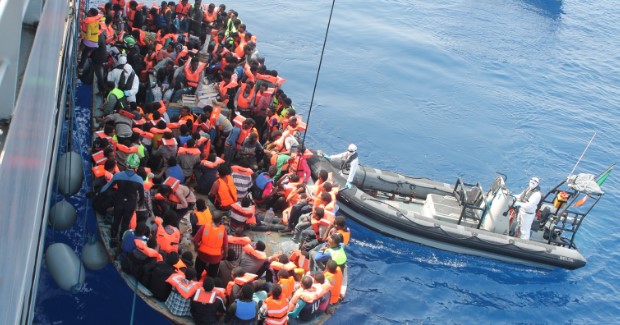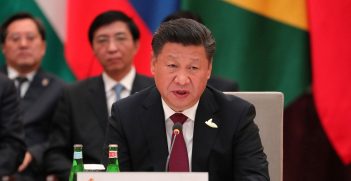EU Migration: From Crisis to Integration

As we mark World Refugee Day, a migration crisis continues to linger at the doorstep of Europe after more than 1.3 million refugees entered the continent in 2015. Refugee numbers are starting to recede, but it is time for the European Union to look towards effective integration measures.
In recent years, both German Chancellor Angela Merkel and British Prime Minister David Cameron have declared that “multiculturalism has failed” with regard to helping migrants become part of their adopted societies. Since then, the number of new migrants arriving in Europe has fallen and the majority of far-right political parties in Europe today—their numbers rising—tend to favour assimilation over integration.
Germany has seen more than 1 million asylum seekers pass through its borders since the beginning of the war in Syria. Now that this flow is finally starting to ebb, Angela Merkel is pushing for new integration laws. These will see the responsibility lie with the refugees, essentially punishing those who fail to assimilate with the German lifestyle. Merkel’s method of forced assimilation does not bode well. The new measures will see asylum seekers lose state support if they fail to comply with government initiatives, including attending language classes or lessons in German law.
While some degree of assimilation is useful, this adapt-or-die strategy seems to promote discrimination and punishment as opposed to a peaceful co-existence of cultures. The policy of punishing refugees who have no prior experience of the German way of life seems doomed to fail. Instead, European countries should look more towards a holistic approach that dissuades segregation.
Discrimination and inconsistency
The first step to effective integration should be combating discrimination. As there is no consistent EU law concerning this, rules pertaining to discriminatory behaviour vary greatly from state to state. Interestingly, in Hungary and Latvia, only 30-40 per cent of people believe that immigrants should have equal rights, while elsewhere in Poland and Spain this figure sits at 80-90 per cent.
Combating discriminatory and inconsistent policies is crucial to effective integration. In Germany the law requiring German and EU citizens to be given preference in job applications has been temporary lifted. There is also ongoing questioning of the Dublin Agreement, which requires that the country the refugee enters is responsible for the processing, welfare and housing of the refugees. The latter has created unsavoury feelings between EU member states with southern states feeling they are bearing the brunt of the burden in comparison with their northern counterparts. Combating these and other inconsistent and discriminatory policies is an important first step.
Prejudice against particular groups or ethnicities has a negative impact on society, as does a lack of consistency between EU member states themselves. The flow of refugees is not going to stop; rather than promoting discrimination or states shifting responsibility to their neighbours, members of the EU should focus on implementing a homogeneous and inclusive EU-wide integration policy.
Holistic integration
For most refugees, every aspect of their new life is foreign. After overcoming the initial elation of being allowed to settle in a new place, the alien environment may be overwhelming. Some arrivals may have never seen an electricity bill or used a garbage disposal service. For many refugees it may have been a long time since they experienced the rule of law or stability such as that found in EU states. Without the necessary skills and language, finding a job may appear tiring and hopeless. A strong and multifaceted support system is crucial.
The best support enables faster integration, creates a positive image of the refugees’ new country and allows for understanding of how their new society functions. Integration is a multifaceted approach that relies heavily on states having policies and systems to process people. No single sector can deal with migration on its own. As such, there needs to be consideration of the various ways of supporting migrant integration: assisting with entry into the labour market; access to affordable housing, education and health; political participation; family reconciliation; permanent residency and citizenship; and dealing with discrimination.
An economic opportunity
The discrimination and offloading of refugees by EU states does not make economic sense. By moving towards an inclusive and holistic integration policy, Europe is well placed to benefit from these large numbers of refugees. Many EU citizens still believe that migrants are a negative burden on the economy and society; however, studies consistently show that migrants have a positive impact on the economy in the long term. Migrants tend to make important contributions to the labour market and contribute more in taxes than they receive from state benefits. Moreover, migrants in Europe migrants tend to take up the jobs not wanted by others and fill the gaps in the market. Currently, there is a skills shortage that is affecting around 40 per cent of European employers. An influx of readily available migrants willing to fill the employment gaps offers a solution to this.
Adding to the value of migrants is their young age. The majority of refugees are below 18 years old. For Europe in particular, this holds promise. With states such as Italy now dealing with aging and declining populations, young migrants offer a unique opportunity to develop the country again, both socially and economically.
The flow of refugees is unavoidable. As it slowly starts to ebb, it is important that states look towards integration. An integrated and unified Europe remains better placed than anywhere else to reap the rewards of a young and able migrant population. By focusing on holistic, anti-discriminatory measures that are consistent across the EU and developing a change in mindset, Europe’s so-called migration crisis has the potential to become an asset.
Margaret Goydych completed a Bachelor of International Relations at the Australian National University. Kelsea Pyke is studying a double degree in International Relations and Economics at Curtin University. This article is published under a Creative Commons Licence and may be republished with attribution.





